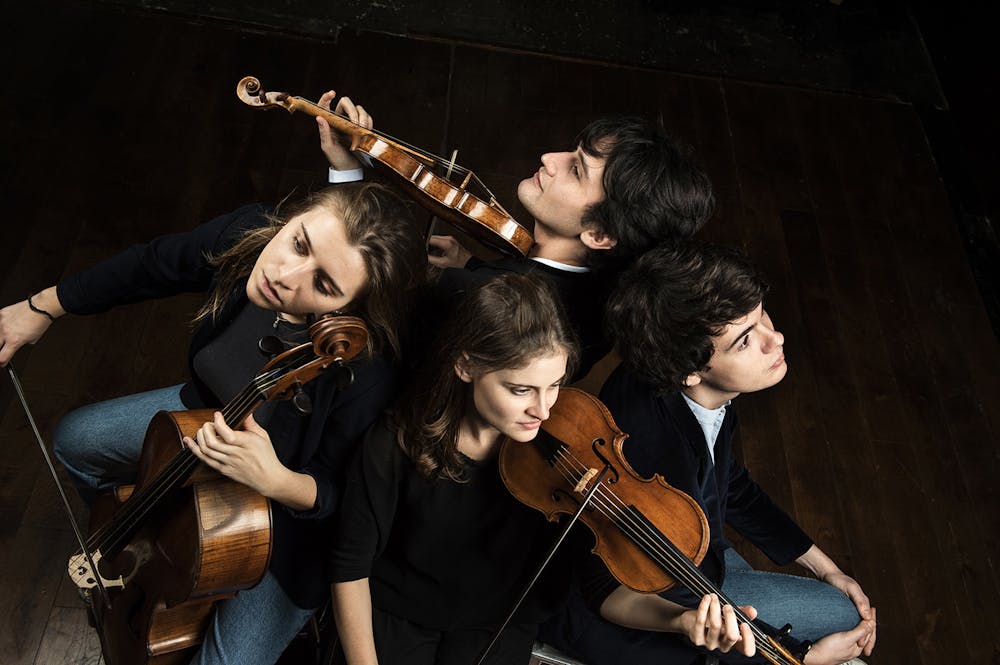Music lovers from the college and Middlebury community alike gathered on Thursday, Feb. 22 at the Mahaney Arts Center for an evening of Baroque chamber music brought to Middlebury by Le Consort, a quartet of talented French string musicians that formed in 2015.
The ensemble is co-directed by violinist Théotime Langlois de Swarte and harpsichordist Justin Taylor. Taylor, violinist Sophie de Bardonnèche and cellist Hanna Salzenstein were joined onstage by guest violinist Augusta McKay Lodge, who is playing with the ensemble while de Swarte is on paternity leave following the birth of his second child.
The concert began at 7:30 p.m. in Robison Hall with Antonio Vivaldi’s first ever published work: the Trio Sonata in G-minor, Op. 1, No. 1. Over the next two hours, Le Consort performed pieces written by a variety of composers ranging from Giovanni Battista Reali, a little-known Italian composer who published in the early 1700s, to the renowned German composer and musician Johann Sebastian Bach.
De Bardonnèche shared the intentionality behind Le Consort’s wide-ranging repertoire.
“We love to mix famous composers with composers that no one knows,” she said.“We try to give a new way to approach Baroque music so that it feels natural and more accessible. We want to express feelings [and] playing by heart is a way to do that and express the music.”
This fresh and expressive approach to playing classical Baroque works was evident in Le Consort’s passionate, intimate performances, which ranged in sonic quality from crisp and clean melodies to lush and dramatic layering of instrumental parts. The invigorating and expressive playing of the ensemble was made possible by strong communication between the musicians, who paid close attention to one another and to first violinist de Bardonnèche as their leader.
Watching and listening to Le Consort perform live added dimensionality to the concert experience, as their onstage interactions added a new texture to the shared act of making music. The effect of fully collaborative performance was entrancing, giving new life to old music.
“[I] admired the interactions between them,” audience member Roeskva Torhalsdottir ’25 said.
“It was clear they were enjoying it and living in the moment. They had a way of feeling very present and of playing to me — it felt very personal.”
The intimacy of the experience was enhanced by the vulnerability on the musicians’ faces while they played their instruments, and the movement of the music through their bodies, catching and holding the audience's attention. Witnessing the artists’ familiarity with their instruments and their mastery of each piece made it feel as though they were simultaneously singing and dancing with their instruments.
Violinist de Bardonnèche was a dynamic and compelling presence onstage, leading the group skillfully in de Swarte’s absence. Despite one or two brief hesitations or momentary timing errors, the vigor and cohesion with which the group played during McKay Lodge’s first performance with the ensemble is a testament to their strength. In fact, the need for communication heightened by this departure from normalcy seemed to encourage each member to be less an individual musician and more a piece of the whole ensemble.
For the penultimate piece of the program, the ensemble played Bach’s Concerto in “D Minor, BWV 974,” by heart. Both de Bardonnèche and McKay Lodge learned new parts for the performance, and this, along with the spirited contributions of Taylor’s harpsichord and Salzenstein’s cello, lent an electric energy to the movement.
The performance of Bach’s concerto stood out as the most vibrant and engaging selection of the night, perhaps convincing the audience to agree with de Bardonnèche: Playing a piece from memory does increase the expressiveness of the performers, adding to the emotional experience of the audience.
Le Consort’s performance at Middlebury last week was a part of their North American tour in Canada and the United States this season. The group has enjoyed success across Europe and is listed by the concert program as being in residence at the Banque de France, the Singer-Polignac Foundation and the Abbaye de Royaumont.
Let’s hope that this isn’t goodbye but rather au revoir. Audience members were certainly keen to say merci after their stop in Middlebury.




